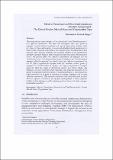PUC Institutional Repository
Effects of Procedural and Distributive Justice on Affective Commitment: The Role of Gender, Marital Status and Organization Type
JavaScript is disabled for your browser. Some features of this site may not work without it.
| dc.contributor.author | Haque, Mohammad Moinul | |
| dc.date.accessioned | 2022-01-04T06:24:59Z | |
| dc.date.available | 2022-01-04T06:24:59Z | |
| dc.date.issued | 2016-07 | |
| dc.identifier.issn | 2075-650X | |
| dc.identifier.uri | http://digitalarchives.puc.ac.bd:8080/xmlui/handle/123456789/63 | |
| dc.description.abstract | This study aims to explore the effects of' 'procedural justice' and 'distributive justice' over 'affective commitment'. The paper also investigates what roles 'gender of employee', 'marital status of employee' and 'type of organization employee works for' play over these relationships. A structured self-administered questionnaire is used to collect responses and a total of 207 responses from 18 organizations were collected. After checking reliability and construct validity of the questionnaire, Multiple Regression Model is used to analyze the data. It is found that 'procedural justice' has positive effect over 'affective commitment' of employees but not 'distributive justice'. It is also found that 'gender of employee' and 'marital status of employee' affect the impact of 'procedural justice' over 'affective commitment' but not the 'type of organization employee works for'. However, neither 'gender of employee' nor 'marital status of employee' nor 'type of organization employees works for' affect the impact of 'distributive justice'. The results indicate that employees are more concerned about reasonable and impartial procedures to .be applied in organization for distribution of rewards and benefits. It is also found that if fair procedures be in place to distribute everything, employees will be more 'affective commitment'. This research contributes to the limited literature available about the affective commitment of employees of Bangladesh. It shows empirical evidence in favor of proper, sensible and fair procedures to be used to make employees emotionally committed. | en_US |
| dc.language.iso | en_US | en_US |
| dc.publisher | Premier University, Chattogram | en_US |
| dc.relation.ispartofseries | Premier Critical Perspective;Vol. 2, Issue.1, July 2016, P. 1-23 | |
| dc.subject | Affective Commitment, Procedural and Distributive Justice, Gender, Marital Status, Organization Type | en_US |
| dc.title | Effects of Procedural and Distributive Justice on Affective Commitment: The Role of Gender, Marital Status and Organization Type | en_US |
| dc.type | Article | en_US |
